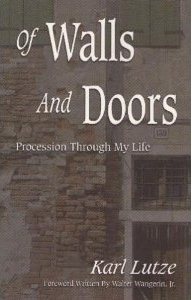 Profound! Delightful! Insightful! Enriching! All of the above.
Profound! Delightful! Insightful! Enriching! All of the above.
I probably like this book so much because I had the chance to live in the author’s home for over a week while in diaconal formation. We were so busy with formation that I didn’t get to visit with him and his wife as much I wanted to, but, the times we did have together were rich. I am so thankful that he introduced me to his book.
The title expresses the themes of this book. Walls can be both helpful and harmful. The author states that diphtheria shots, bumpers around the crib, good nutrition were all helpful walls that provided safety. I would add, and the author discusses, harmful walls as well, such as racism, that do not protect, but, in fact, cause damage.
In the prologue, the author writes, “But I am grateful too for doorways in my life, doors that opened to me unexpected experiences, increased understandings, new visions.” The author does a wonderful job of identifying incidents and people that were pivotal in his life. These are the incidents and the people who shaped him and formed him. These are the incidents and people who guided him into new vistas of ministry.
The author began his pastoral ministry in Oklahoma as the pastor of a very small congregation of people of African-American descent. Described in the book are a number of incidents that helped prepare him for this ministry, but the foundations are laid for a pioneering ministry that led him into many controversial situations. Now in his 90’s, this author provides vibrant insight into ministry and service that goes on even today.
My favorite story in the entire book (probably because of my current ministry) is the story of his mother in the nursing home. She had been a fiercely independent person her entire life, and when he is visiting her on a Sunday evening, he is present when she orders her evening meal. Sunday evening is the day that the home serves hot dogs, and he listens as his mother orders hot coffee with no cream. As the attendant leaves, he questions his mother, because she never drinks coffee in the evening and always drinks coffee with cream. She responds that the hot dogs are usually served cold, and she then dunks them in the coffee to warm them up. The story of independence is powerful to me and it says a lot about her and about why the author became a person with the same creatively independent streak. I love it when people take control of their own surroundings. I fell in love with his mother, although I have never met her.
There are numerous stories of people and incidents regarding the church and church’s approach to persons of color. The author was in the forefront of the civil rights movement, with particular application to the Lutheran church.
There is a story of his journey to enter seminary that is absolutely profound, as he is faced with his own embedded forms of racism. His brief encounter with a porter on the train and his sudden awareness of his own language patterns, bring him directly in touch with some of his own behaviors that he comes to find uncomfortable. Significant learning takes place as a result of reflecting upon this incident.
The book is filled with such stories and each story demonstrates how the person or incident helped the author become who he is as a person and as a servant of Christ. It lays out a pattern of reflection that leads to insight and understanding. The author identifies and reflects upon the pivot points of his life.
The book also helps me reflect on the people and incidents in my own life that have shaped me into who I am today. Sometimes we can just keep going without asking these wonderfully reflective questions that foster self-understanding. I hope to begin a similar project; not for a book, but, for self-understanding.
Dr. Walter Wangerin, in the forward to this book, writes:
“In other words, in this book Karl Lutze accomplishes for us something of central importance to the continuity of our communities. He tells the stories of the generations just before ours. For he participated. He tells in small the true stories of the past of us all.
“It is from generation to generation that we are what we are. Karl–by his personal experience and its narrative here—connects the generations. His book makes a pathway, therefore, for the passages of identity, the transmission of shape and behavior and goodness and substance from our grandparents to their grandchildren.”
The book is available by e-mailing Gail Lutze at (gaillutze@yahoo.com). The cost, mailing included, would be $15 per book. It is well worth the reading.



